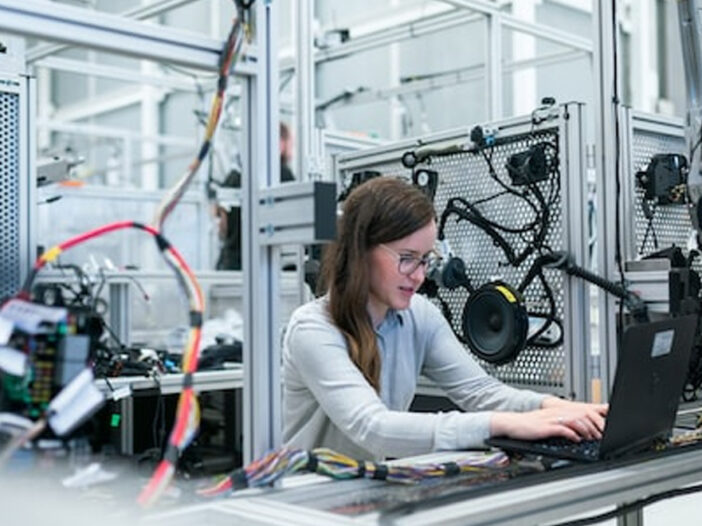
Artificial intelligence (AI) technology is blossoming with opportunities for new and innovative industries. The opportunities for AI technology are endless with its ability to transform how we live and work. In this guide, we’ll discuss how AI is being used in various industries today and the potential implications of this technology.
AI in Manufacturing
In the manufacturing industry, an AI neural network can be used in several ways to optimize processes and ensure quality. One common use of AI in manufacturing is to monitor production lines and identify potential issues.
For example, if a machine on the line is not working properly, the AI system can detect that and flag it for repair. This helps to reduce downtime and keep the line running smoothly.
Another way that AI is being used in manufacturing is to improve quality control. For instance, manufacturers use machine learning algorithms to inspect products automatically for defects. This helps to catch errors that may otherwise go unnoticed. Additionally, AI can predict product failures before they happen, which can help prevent recalls or other costly mistakes.
Overall, AI has the potential to make a big impact on the manufacturing industry by helping companies optimize their processes and maintain high levels of quality control. With its ability to automate tasks and make accurate predictions, AI can be a valuable tool for businesses looking to stay competitive in today’s economy.

AI in Healthcare
AI in healthcare is a fascinating and rapidly-growing field. There are many potential applications for AI in healthcare, from diagnosis to treatment to prevention. One of the most promising applications of AI in healthcare is in the area of diagnosis.
AI can be used to help doctors to diagnose diseases by analyzing medical images or other data. For example, DeepMind has developed an AI system that can diagnose eye diseases more accurately than human doctors.
AI can also help doctors choose the best treatment for their patients. For example, a company called Atomwise has developed an AI system to help doctors choose the best drug treatments for their patients. AI can also be used to help doctors to prevent diseases.
For example, a company called Wellist has developed an AI system that can help doctors identify patients at risk of developing diseases such as heart disease and cancer. There are many other potential applications of AI in healthcare, including developing new drugs and identifying new medical treatments. The potential of AI in healthcare is huge, and the field is rapidly growing.
AI in Retail
Retailers have always been interested in understanding their customers and providing them with the best possible experiences. However, with the advent of AI, retailers can now personalize customer experiences in a way that was not possible before.
Amazon, for instance, uses machine learning algorithms to study customer behavior and recommend products accordingly. This means that if you have been browsing for a new laptop, Amazon will not only show you the laptops you have been looking at, but it will also recommend similar products that you may be interested in.
Similarly, Netflix uses machine learning algorithms to recommend new movies and TV shows to its users. These recommendations are based on the user’s past viewing history and preferences.
Retailers can use AI to personalize customer experiences in a number of ways. By understanding customer behavior and preferences, retailers can provide customers with recommendations for products they are likely interested in.
This can not only improve the customer experience, but it can also help to increase sales. Retailers can also use AI to improve the customer’s shopping experience. For example, retailers can use AI to personalize the layout of their websites or to suggest products that may be of interest to the customer.
AI in Law Enforcement
Artificial intelligence has been used in law enforcement and legal strategies for various purposes, such as crime prediction and prevention. In the past, police officers had to rely on their intuition and experience when investigating crimes and making arrests.
However, with the help of AI, they can now use data to make more informed decisions. For example, by analyzing crime data, AI can identify patterns indicating that a particular crime is about to be committed. This information can then be used to prevent the crime or apprehend the perpetrator before they have a chance to commit any further crimes.
Additionally, AI can also be used to improve eyewitness identification processes. Using video footage of suspects, AI can help identify them more accurately than humans can. This speeds up the identification process and reduces the number of false identifications made by humans.
AI is being used in various industries today to improve efficiency, accuracy, and productivity. This technology is beneficial in improving accuracy and efficiency. As such, businesses and organizations should consider implementing AI into their operations to reap the many benefits it has to offer.
